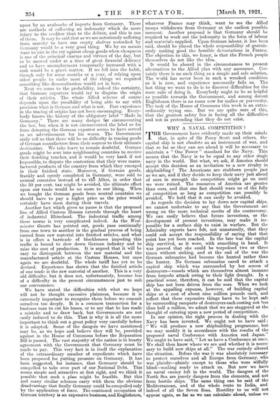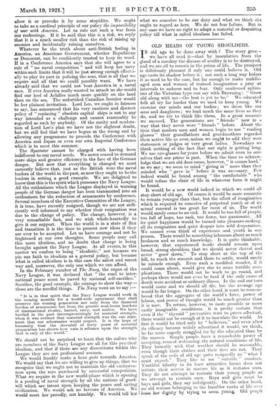WHY A NAVAL COMPETITION ? T HE Government have evidently made
up their minds that, in spite of Sir Percy Scott and others, the capital ship is not obsolete as an instrument of war, and that so far as they can see ahead it will be necessary to maintain a " One Power " standard for the Navy. This means that the Navy is to be equal to any other single navy in the world. But what, we ask, if America should accept this decision as an invitation to a new rivalry in shipbuilding ? The Americans are stubborn people just as we are, and if they decide to keep their navy just ahead of ours in strength the competition might go on until we were ruined. The resources of America are greater than ours, and that one fact should warn us of the folly of competition so long as competition can possibly be avoided. We hold that it can easily be avoided. As regards the decision to lay down new capital ships, we cannot undertake to say that the Government are wrong on the mere technical merits of the controversy. We can easily believe that future inventions, or the development of present inventions, may make it im- possible for a surface ship to exist in warfare. But the Admiralty experts have felt, not unnaturally, that they could not accept the responsibility of saying that that point has yet been reached. In the late war the capital ship survived, as it were, with something in hand. It was proved that she could be torpedoed two or three times without sinking, and at the end of the war the German submarine had become the hunted rather than the hunter. No German submarine cared to attack a capital ship which was surrounded by her screen of destroyers—vessels which are themselves almost immune from torpedo attack owing to their light draught. In a practical sense, therefore, it can be said that the capital ship has not been driven from the seas. When we look at the appalling expense, however, of building capital ships at a cost of about nine million pounds each, and reflect that these expensive things have to be kept safe by surrounding ramparts of destroyers each costing not less than half a million, we admit that we are staggered at the thought of entering upon a new period of competition.
In our opinion, the right process in dealing with the Navy has been inverted. We ought not to have said : " We will produce a new shipbuilding programme, but we may modify it in accordance with the results of the proposed naval Conference with America and Japan." We ought to have said, " Let us have a Conference at once. We shall then know where we are and whether it is neces- sary to build new ships at all." The war entirely altered the situation. Before the war it was absolutely necessary to protect ourselves and all Europe from Germany, who was plainly—plainly except to those who were wilfully blind—making ready to attack us. But now we have no naval enemy left in the world. The dangers of the North Sea are purely dangers from the elements, and not from hostile ships. The same thing can be said of the Mediterranean, and of the whole route to India, and indeed of all the Seven Seas. Hostility to us will not appear again, so far as we can calculate ahead, unless we allow it or provoke it by some stupidity. We ought to take as a cardinal principle of our policy the impos&Ibility of war with America. Let us rule out such a war from our reckonings. If it be said that this is a risk, we reply that it is a much smaller risk than the risk of raising up enemies and incidentally ruining ourselves. Whatever be the truth about anti-British feeling in America, an American Government, whether Republican or Democrat, can be confidently trusted to keep its word. If in a Conference America says that she will agree to a rule of " no naval competition " and will keep her navy within such limits that it will be just strong enough effectu- ally to play its part in policing the seas, that is all that we require and all that we could possibly want. We have already said that we could not beat America in a naval race. If ever America really wanted to attack us she would find our heel of Achilles much more quickly on the land than on the sea. The unfortified Canadian frontier would be her plainest invitation. Lord Lee, we ought in fairness to say, has announced that his very cautious and discreet policy of " replacing " obsolete capital ships is not in any way intended as a challenge and cannot reasonably be regarded as such by anybody. Of the sanity and modera- tion of Lord Lee's plan we have not the slightest doubt, but we still feel that we have begun at the wrong end by allowing any programme to precede the Conference with America and Japan or even our own Imperial Conference which is to meet this summer.
The Spectator cannot be charged with having been indifferent to our naval needs. We never ceased to demand more ships and greater efficiency in the face of the German danger. But now that everything is changed we most earnestly believe that, just as the British were the naval leaders of the world in the past, so now they ought to be the leaders in setting a good example. We are delighted to know that this is the spirit which possesses the Navy League. All the enthusiasm which the League displayed in warning people of the German danger has been transmuted into an enthusiasm for the reduction of armaments by conference. Several members of the Executive Committee of the League, it is true, have recently resigned, though we are not suffi- ciently well informed to say whether their resignation was due to the change of policy. The change, however, is a very remarkable fact, and we wish whole-heartedly to give it our support. When the world is in a state of flux and transition it is the time to present new ideas if they are ever to be accepted. Let us have courage and not be frightened at our own thoughts. Some people may call this mere idealism, and no doubt that charge is being brought against the Navy League. At all events, in this matter we confess to being " idealistic," not because we pin our faith to idealism as a general policy, but because what is called idealism is in this case the safest and surest way and, moreover, the only one which we can afford. In the February number of The Navy, the organ of the Navy League, it was declared that " the road to inter- national peace must be paved by national self-sacrifice." Sacrifice, the good example, the courage to show the way— those are the needful things. The Navy went on to say :- " It is in that spirit that the Navy League would work in the coming months for a world-wide agreement that shall preserve the coming generation not only from the financial burden of armaments but from the greater soul-borne burdens of international rivalry, hatred, envy, and malice. We have battled in the past uncompromisingly for material strength, when it was evident that material strength was the one argu- ment that our adversaries would respect. It is the hope of humanity that the downfall of forty years of material preparation has shown how vain is reliance upon the strength that is only of this world."
We should not be surprised to learn that the sailors who are members of the Navy League are all for this practical idealism, and that if there are any dissentients within the League they are not professional seamen. We would frankly make a beau geste towards America. We would say that we are willing to give up things, that we recognize that we ought not to maintain the old exclusive- ness upon the seas purchased by successful competition. What we require in the new world-phase which is opening is a pooling of naval strength by all the nations of good- will which are intent upon keeping the peace and saving civilization. We would ask no favours of America. We would meet her proudly, not humbly. We would tell her what we conceive to be our duty and what we think she ought to regard as hers. We do not fear failure. But in any case we have no right to adopt a material or despairing policy till what is Galled idealism has failed.



































 Previous page
Previous page